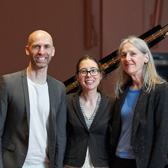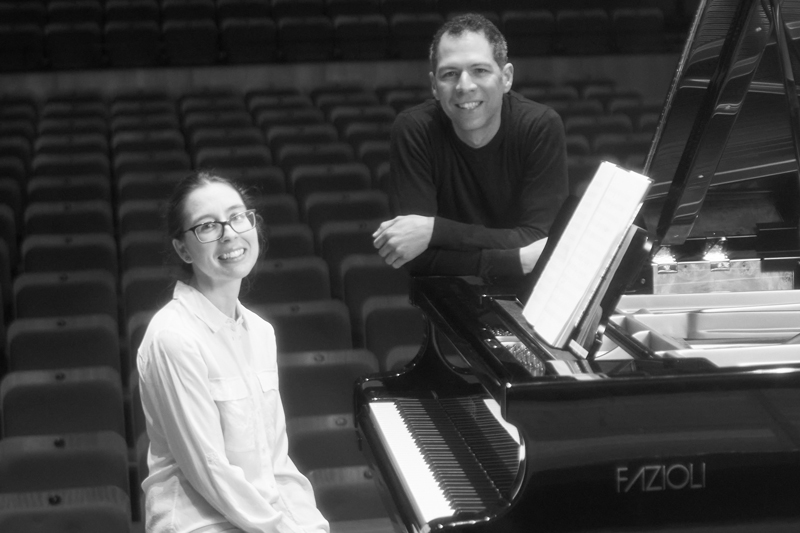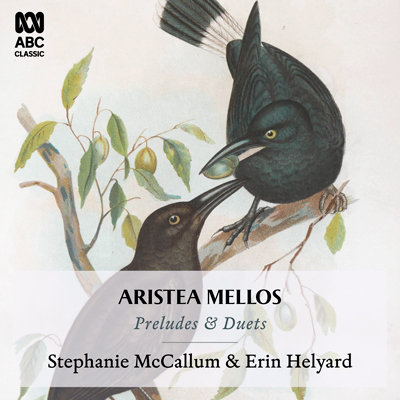25 October 2022
Preludes & Duets: Embracing the Love Trap and the Power of Mentorship
 Image: Erin Helyard, Aristea Mellos, and Stephanie McCallum post-recording at Sydney Conservatorium
Image: Erin Helyard, Aristea Mellos, and Stephanie McCallum post-recording at Sydney Conservatorium © Nathan Tam
As a young, female composition student, I was often given (unsolicited) advice on how best to balance a career in music with family life. A crustier, older generation of composers presented it as a stark choice between either pursuing a life of excellence or giving it all up to be a domestic slave. The fault for this dichotomy, they explained, was the "love trap" - a tangle of maternal responsibility and familial obligation which rendered one entirely incapable of creative work.
On another occasion, a venerable professor advised me that to have a career and a family, I had to first "find a good wife who could undertake secretarial duties" (to be fair, probably good advice when he first received it an aeon ago). So, it was with some relief that I met the American composer and pianist Amy Williams (Professor of Composition at the University of Pittsburgh) in 2016, who informed me I could indeed have it all, on one condition: that I had a partner who valued my work enough to give me time to write. This, she explained, was the only way in which she had managed to find that elusive balance.
In March of 2020, when a global pandemic was declared, I was five months pregnant with my daughter, Sophia. I had imagined that this period of my life would be joyfully productive. Instead, I found myself to be distracted, fatigued, and in no mood to compose. The tap of musical inspiration seemed firmly shut. As 2020 gave way to 2021, and I adjusted to my new life as a mother, I struggled to find the time or mental space to create. The unholy trifecta of sleep deprivation, physical exhaustion, and loneliness had got to me. Perhaps the Thatcheresque sentinels of academia were correct: I had made my choice, had fallen prey to the "love trap", and now had to suffer its consequence, silence.
Then, Sydney locked down once more, and as the weeks dragged on, I became increasingly restless. At this point, my husband intervened. He began taking our daughter out for long walks to the park so that I could try to return to composition. During these windows of "alone time", I found that I was ready to dive into a new project. The tap had been turned back on, and so, the Preludes were born.
The first Prelude in the book, "A ghostly finger writes forgotten words (in the dust of the piano)" was composed in 2019. The Australian concert pianist, Stephanie McCallum had performed the work in April 2021 at the Women's Club in Sydney, and as I completed the draft of the second Prelude during lockdown, it was to Stephanie that I wrote.
"I'm interested in composing a set of Preludes… I'd like to plan a recording project, and I was wondering if you'd be interested in recording the works?" Stephanie replied in the affirmative, and asked how many works would be included: "Will it be 12 Preludes? 24? Or...(another) number?"
"I'll aim for 12", I replied. "I've discovered that motherhood isn't conducive to creative productivity, and I think lockdown just exacerbates feelings of domestic confinement. But, if I give myself a deadline, I know I'll work towards it."
As the weeks rolled into months, the project became a lifeline for my sanity, and my email exchanges with Stephanie became a rare opportunity to engage with someone outside of my own household.
In September 2021, as I sent through the draft of Prelude III (a comical work about the trials of teaching scales over buffering Zoom calls), we commiserated over the frustration of teaching through a screen. At the email's conclusion, Stephanie remarked that she couldn't imagine how hard baby lockdown was. I replied, "There are some days when I look at the clock at 8am and have no idea how we're going to make it through the day."
A few weeks later, I emailed the Stephanie the draft for Prelude IV, a work that explores the ongoing crisis of Indigenous Australian deaths in custody. "This one's a bit dark", I warned. "It is very eloquent...", Stephanie replied. "I am so much enjoying having these little creative gifts every so often in this rather arid landscape we are currently inhabiting."
With each little email exchange, I could feel myself rediscovering the joy that comes from forging a truly collaborative partnership with a performer. There was a sense of solidarity in our conversations, and as Preludes V, VI and VII found their way into Stephanie's hands, I found myself growing in confidence. We shared stories about listening to magpies near the clothesline (Prelude VII), we reminisced about old family holidays and unfulfilled wanderlust (Prelude VI), and the joys of a summer spent at the shore (Preludes VIII & IX). Stephanie's encouragement and feedback was crucial in keeping me going, helping me to push past the mental fog, and to enjoy the process of creating music once more.
And of course, we talked about motherhood, and how to find the seemingly impossible balance of care and career. By this stage, I began to regard Stephanie as a mentor - someone older and wiser who had undergone this difficult journey decades ago, and who had come out the other side conquering the "Alps and Himalayas of pianism" (Hugh McDonald). Upon reflection, I think that many of our conversations directly influenced the final Preludes of the Book. Prelude X "Hush my beloved…" (which was nicknamed 'Djoko's Lullaby' after my daughter's favourite stuffed toy), and Preludes XI and XII (which were written in the early days of Putin's invasion of the Ukraine), each draw from the joys and pain of motherhood. My collaboration with Stephanie on the Preludes made me believe that the moments that define motherhood are worthy of being the subject of art. In this way, I began to embrace the "love trap", and believe that my little domestic universe was a valid source of inspiration.

(recording engineer and editor on Preludes & Duets) post-recording.
© Nathan Tam
Having completed the Preludes in May of 2022 ahead of our recording session for ABC Classic, I turned my attention to the next work on the album, The Immigrant Suite - a four hands work for Stephanie and her duo partner Dr Erin Helyard (Artistic Director of Pinchgut Opera). By this stage, Sophia (my daughter) was almost two years old: a walking, talking toddler of boundless energy with a penchant for all things tutu. As I began composing the new work, my ninety-two-year-old grandmother became increasingly frail. The "love trap" struck again, and I found myself juggling the oddly overlapping needs of the very elderly and the very young all at once. But rather than letting the situation prevent any creative work, I tried to let it feed and inspire it as much as possible.
Visiting my grandmother with a plate of food, over a cup of her bitter Birko-kettle coffee, we'd flick through photo albums, and I'd ask questions. When did you leave Athens? What was the name of the boat you travelled on? How long was the journey? And although if I had asked her what day of the week it was, she wouldn't have been able to tell me, her long-term recall was impeccable. Over several weeks, I pieced together her life's narrative: "I travelled on the S.S. Goya in 1951. It was a refugee transport. The smells from the boat's kitchens made me nauseous. The journey took two months. Then I was interred at the Pahiatua camp." I found a photo of her with some of the new arrivals raising a glass in celebration, and a fuzzier photo of her in the workroom at David Jones' Elizabeth Street store, where she worked for thirty years. "Second Floor: Menswear!" she chimed.
Borrowing the candid shot of her with the sewing machine, I cracked open a blank manuscript book, placed the photo of my grandmother to the side of the piano stand, and rested my hands on the keys, sketching furiously as the music flowed. After drafting each movement, I emailed Stephanie and Erin, and our conversations continued. "I remember the six o'clock swill period down at Circular Quay!" wrote Stephanie upon receipt of the second movement - a drunken tarantella that devolves into a lopsided tango. "When you are ready", she continued, "I would love to go through the final edit with a fine-tooth comb."
Stephanie, Erin and I met in August to workshop the Suite, before recording the work in late September at the Sydney Conservatorium of Music. As we entered the post-production phase, I took stock of the year's productivity: a full album of original works. In my opinion, made possible by two things: the unfailing support of a partner who prioritised my need to compose, and the generous mentorship of a remarkable collaborative partner. Two essential ingredients for young women seeking to balance a composition career with the love and loving obligations of family life.

The Preludes will receive their world premiere by Stephanie McCallum at 7pm, 26 November at Verbrugghen Hall, Sydney Conservatorium of Music. Tickets to this event are free thanks to the generous support of the University of Sydney and Create NSW.
Preludes & Duets will be released by ABC Classic on 26 November 2022.
The score for Preludes and the Immigrant Suite will be available for purchase from the AMC from 26 November.
© Australian Music Centre (2022) — Permission must be obtained from the AMC if you wish to reproduce this article either online or in print.
Subjects discussed by this article:
Dr Aristea Mellos is an Australian composer of contemporary classical music. Born on the island of Crete, she received her formative musical training in Sydney, where she was an avid chorister and also studied classical piano.
Comments
Be the first to share add your thoughts and opinions in response to this article.
You must login to post a comment.